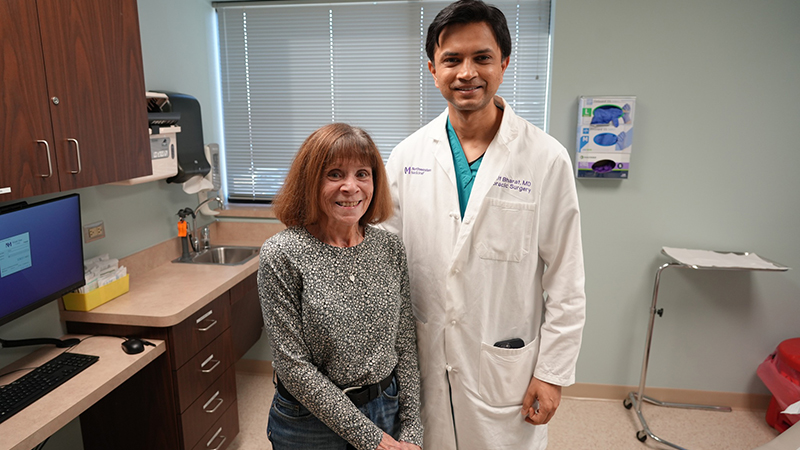ECMO to the Rescue
Expanding Access to Lifesaving Lung Support
Published February 2023
When a patient experiences a life-threatening illness or injury that prevents their lungs or heart from working properly, extracorporeal membrane oxygenation (ECMO) — an advanced form of life support — may be needed. ECMO is typically performed at larger medical centers, which have the technology and expertise to offer this advanced level of life support.
"When medications and a breathing machine aren't enough, ECMO can serve as a bridge to medical improvement or a lung transplant," says Kalvin Lung, MD, a thoracic surgeon with Northwestern Medicine Canning Thoracic Institute. "We tend to use ECMO for patients who have severe lung failure from illness and injuries such as COVID-19, the flu, pneumonia, drowning and gunshot wounds. ECMO has fewer complications than using a ventilator to assist the lungs. In large part, we've become so much better with using ECMO because of COVID-19 and the flu."
How ECMO Works
ECMO can serve as a bridge to medical improvement.— Kalvin Lung, MD
ECMO does not treat lung or heart failure, but it does the jobs of the heart and lungs temporarily, allowing them to rest and providing more time to treat an underlying condition. ECMO involves a machine located outside the body that pumps the patient's blood, provides it with oxygen and helps the body get rid of carbon dioxide. The machine then returns the oxygenated blood to the patient.
When the ECMO machine is running, the non-oxygenated blood being removed from the body is dark red. After it's oxygenated by the machine, the returning blood is bright red.
Reasons to Use ECMO
The main reason to use ECMO therapy is severe lung failure that cannot be treated by medications or a breathing machine like a ventilator. Conditions that may require ECMO include:
- Acute respiratory distress syndrome from viral or bacterial pneumonia
- Respiratory failure due to too much carbon dioxide or not enough oxygen in the blood
- Supportive care while waiting for lung or heart transplantation
- Severe lung injury immediately after transplantation
- Heart attack
- Pulmonary embolism, or a blockage in the pulmonary artery of the lungs
- Severe damage to the lungs from a respiratory illness, like influenza or COVID-19
- Sepsis (a life-threatening reaction to infection)
Patients can remain on ECMO for days, weeks or even months. Duration will depend on the underlying condition that caused the lung injury, whether the lung is expected to recover, or donor availability if the patient is waiting for an organ transplant. Unlike treatment with a ventilator, patients do not always need to be sedated to receive ECMO therapy. They may also be able to talk while on ECMO.
To help bring lifesaving ECMO therapy to even more patients across Illinois, Northwestern Medicine has created a mobile ECMO service called the Regional Lung Rescue Program.
Expanded Access to ECMO
The Northwestern Medicine Regional Lung Rescue Program increases access to ECMO therapy in communities across Illinois. Most patients with acute lung failure are not stable enough to be transported to a hospital that has ECMO, so this program brings ECMO to the patient. The Northwestern Medicine team travels to hospitals across Illinois to start ECMO for the patient. Once the patient is stable, an ambulance equipped with built-in ICU equipment can bring them to Northwestern Memorial Hospital in downtown Chicago for monitoring and further treatment.
"Without ECMO, many of these patients would not have survived," says Ankit Bharat, MD, chief of thoracic surgery and director of Canning Thoracic Institute. "Since time is of the essence, we're in constant communication with regional hospital staff to ensure all the necessary medications and resources are mobilized. During times like these, collaboration is vital, and their work ahead of time plays a big part in the efficiency of the ECMO procedure."






